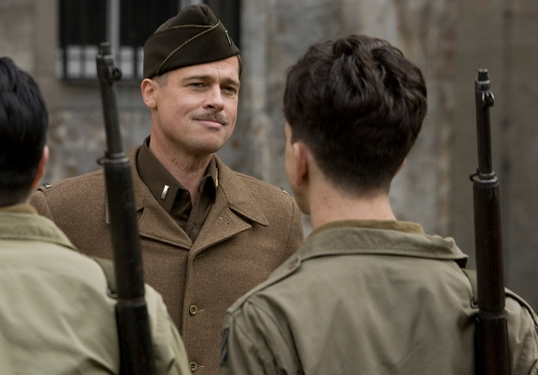Quentin Tarantino's Inglourious Basterds
 Saturday, August 22, 2009 at 1:54AM
Saturday, August 22, 2009 at 1:54AM 
Jay Hoberman, the Village Voice's best reviewer and one of the top film critics in the world is one of a few who have understood and richly analysed this extraordinary film. Inglourious Basterds is not only a classic Tarantino comment upon and play with cinema history, its archetypes, conventions and clichés, it is also and quite ironically a Jewish revenge fantasy. Hoberman comments that filmmakers like Steven Speilberg exercise their will over history by mixing realism and fiction with enough balance to keep audiences believing that truth will eventually win over lies and deceit. At a minimum, Schindler's List will tell the story even if the artifice is an extreme and necessary part of building the drama.
However, Tarantino revels in the contradictions of artifice and loves the multi-faceted ways in which the cinema unveils truth even as it hides it. Tarantino is at least honest about the impact of genre, style and set design upon any cinematic historical reconstruction. The opening of the film, one of the best in recent memory, celebrates not only the cinema of Sergio Leone, but also and more importantly the language of violence and the violence of language. There are always many sides to violence in the cinema. More importantly, violence is inevitably the most artificial part. Both the audience and the filmmaker know that the violence is not real. What they often do not realize is that the language surrounding that violence does more harm than the images.
For example, is there any word in the English language more devalued and yet more often used than 'Nazi'? Although historically specific, it has become a metaphor for violence of all types and a trope for genocide. The smooth talking Nazis of this film use talk to hide their murderous intentions even as they are about to die. They seem cultured but are always on the edge of violence. The key Nazi character, Hans Landa (wonderfully played by Christoph Waltz) plays both criminal and detective, gunslinger and murderer.
Much of the film centres on a cinema in Paris and on the showing of a film that celebrates the hundreds of people killed by a sniper who plays himself. The setting is taken from Le Dernier Metro the film by François Truffaut with further references to his later film, La Nuit Americaine.

Can you name a film in which Hitler dies or is murdered? Can you remember a film in which the entire high command of the Nazis dies?
The reason that so few films that deal with the Second World War allow themselves the poetic license to kill the perpetrators of the Holocaust is that for better or worse stories of victimization seem to fulfill the need to represent history in a truthful fashion. But, of course, as we know, it has been left to people like Mahmoud Ahmadinejhad to create and communicate their fictional universes. Ahmadinejhad and the Protocols of the Elders of Zion are perhaps the best example of how fiction can be made into truth with a variety of effects that can actually change history itself. Everyone knows that the Protocols are a lie, but that has not prevented their continuous dissemination since the early part of the 20th Century and their most recent appearance on Egyptian television.
Tarantino knows all of this and has created a film that reflects in a serious manner on what would have happened if Western culture had recreated the many stories of the war in a different manner. And, he also understands that representations of the war need to reference the genres they use, otherwise they actually reinforce the picture of oppression as inevitable.
The film is as much an exploration of loyalty and betrayal as it is a brilliant piece of research into the underlying premises for nearly every war movie that has ever been made. Add to this, a further exploration of the Western genre as the prototypical example of how Americans view their own history and one realizes that Tarantino has created precisely the story we need to see. In the end, it is a Jewish woman (the only survivor of her family's murder) and a black man who willingly sacrifice their lives to kill the German high command.

Ella Taylor has a wonderful interview with Tarantino here…
David Edelstein has an interesting review here from New York Magazine.
A very negative review by Liel Liebovtiz can be read here.
And, if you can read French, here is a great interview from Cahiers du Cinéma


